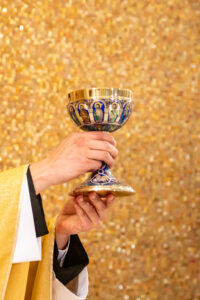
By Kevan Grady
Associate Coordinator of Formation and Mission
On Maundy Thursday 6 April this year the words of the second reading “For whenever you eat this bread and drink this cup, you proclaim the Lord’s death until he comes.” will have renewed significance. On that day, at the Mass of the Lord’s Supper, Bishop Ralph and the other bishops of England and Wales have allowed for the reintroduction of Communion from the chalice after its absence during the Covid Pandemic.
Once again we can fully share in the joy and graces of receiving both the body and blood of Christ in the Eucharist. The words of Jesus, prayed in the Eucharistic Prayer at every Mass, take on a renewed meaning: “Take this, all of you, and drink from it, for this is the cup of my blood, the blood of the new and eternal covenant, which will be poured out for you and for many for the forgiveness of sins. Do this in memory of me.” (RM3, EP I-IV)
In reintroducing the practice Bishop John Sherrington, speaking on behalf of the Bishops’ Conference, said that this provides us with the opportunity also to remind ourselves of Important teaching about the Eucharist “…such as the totality of the body, blood, soul, and divinity of the Lord is received in either or both species, the personal disposition of those receiving holy Communion, and the reverence offered to the Blessed Sacrament…”
This reintroduction of receiving holy Communion from the chalice gives us the opportunity to deepen our Eucharistic faith.
Some people may have valid reservations about receiving from the chalice. However, a reasonable hesitation in the hearts of the faithful can also become an opportunity to investigate anew the Mystery of Christ among us in the Eucharist. Some reservations regarding Communion from the chalice may come from a fear of disease and the possible spread of germs. Professional, peer-reviewed medical research from epidemiologists concluded that there is no known outbreak of disease directly related to this liturgical practice. Common sense would suggest that individuals with illness are encouraged to refrain from the reception of the chalice.


